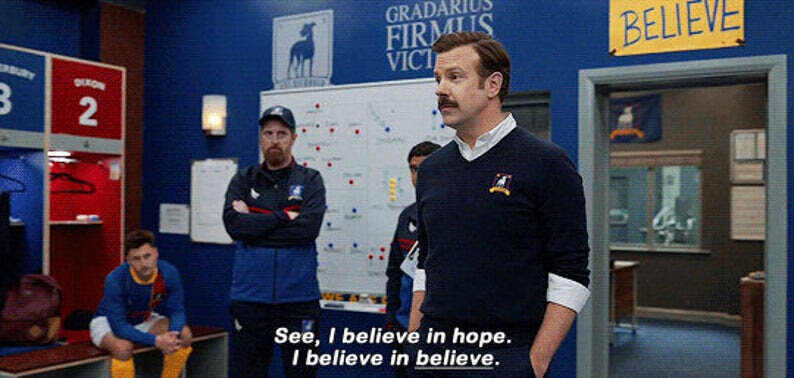Can Ted Lasso Rescue the Red and Blue?
“Try your best to make goodness attractive. That’s one of the toughest assignments you’ll ever be given.” -- Mr. Fred Rogers
Ted Lasso Season 2
“Takin’ on a challenge is a lot like riding a horse. If you’re comfortable while you’re doin’ it, you’re probably doin’ it wrong.” -- Ted Lasso
For years I have said that culture is upstream of politics. I never imagined that politics would turn into performance art, eclipse culture and become completely encompassing. With the decline of traditional identity-forming institutions from the Boy Scouts to religious institutions, party affiliation and political ideology seem to have become the primary means of grounding our identity. What I have noticed at the same time is the gradual coarsening of politics and the culture at large.
And I don’t think these trends are unrelated.
Partisan politics is about winners and losers. In politics there are, generally speaking, two teams and two sides. America is red and it is blue. Yes, there is some purple, but there is less of it than ever.
Several weeks ago Peggy Noonan echoed in her weekly column analyses by left-leaning writers Kevin Drum, David Shor and Andrew Sullivan which pointed to the ideological shift of both parties, but a much greater shift among Democrats to the left than Republicans to the right.
It seems to me that as we associate more through ideological tribes than even our familial ones, we strive to stay in good graces with our new families by conforming to the viewpoints of our tribes’ dominant elites.
A recent NPR piece on the growth of Ben Shapiro’s influence observed that the main reason people want to consume political news has little to do with knowing whom to vote for every four years:
"If that's all you needed to do, you really wouldn't have to consume very much news at all," Munger Penn State political science professor Kevin Munger wrote about in his research on clickbait. "For most people, they're doing it for some combination of entertainment purposes,” he said in the NPR interview, “and wanting to display their knowledge to their social group." That means people want to consume the news that other people in their group consume and trust, and trust in mainstream news has dwindled in recent years among conservatives elevating the influence of voices like Shapiro’s.
Power dynamics and competition are forces of radicalization, and penalize moderation. Elites who want to treat “the other side” kindly, qualify and nuance their own opinions or even “work with the enemy” toward compromise are considered traitors by their in-group elite competitors.
What I have noticed on the right, and believe is happening on the left, is a vilification of “the other side.” In a CBS News poll taken shortly after the storming of the Capitol, more than half of all Americans say the greatest danger to America's way of life comes from their fellow citizens. According to the survey a total of 54 percent of those surveyed said that "other people in America, and domestic enemies" posed the "biggest threat" to American society at this point in time.” Senator Ben Sasse explores this dynamic thoughtfully in his 2018 book Them: Why We Hate Each Other -- and How to Heal.
ben book.jpeg
With this vilification of “the other” comes an escalation of rhetoric, towards each other but also between elites within their own tribes. To show your tribe mates the sincerity of your beliefs, whether it is outrage against police brutality or against abuse of power, one must shout louder than the other.
In my news feeds from the right I have noticed the increased use of verbal violence in the headlines using words such as “slap”, “slam” and “own.” The Washington Post reported on growing permission on the left to use profanity along with increased violent words to express outrage, dumbing down our dialogue and making us deaf to what has always been considered offensive language.
It is into this context that Ted Lasso blows like a fresh wind. Earning Ted 20 Emmy nominations, the show not just which broke records by becoming the most nominated comedy series this year, but the most nominated freshman comedy series in history.
If you don’t know the storyline, Lasso is a guileless, hope-filled and human-nature optimistic college football coach recruited by a failing English soccer team plagued by cynical and jaded owners, players and fans. Although he knows nothing about soccer, he believes that our better angels can be coached, and his response to the verbal abuse and ill-treatment directed to him is kindness, forgiveness and even empathy for his opponents.
He pays a price for his willingness to spread his gospel of “BELIEVE”, including sadly his marriage. At the end of the first season he begins to win over his opponents, but not in the way one would expect.
By now you know that The Clapham group is named after the 18th c. community outside of London. Two of its most prominent members, political William Wilberforce and the playwright and poet Hannah More, worked together to end the slave trade but also shared a commitment to “make goodness fashionable.”
More and Wilberforce recognized the influence of the elites as moral “models” and recruited them in the effort. More maintained, “Reformation must begin with the Great, or it will never be effectual. Their example is the foundation whence the vulgar draw their habits, actions, and characters. To expect to reform the poor while the opulent are corrupt is to throw odors into the stream while the springs are poisoned.”
They also recognized that with this power to shape the culture for good also comes the ability to shape it for worse. As Wilberforce noted “We have now an hypocrisy of an opposite sort, and I believe many affect to be worse in principle than they really are, out of deference to the licentious morals of the fashionable world”-- a comment that remains strikingly relevant today.
I believe that we will not be able to reverse this race to the rhetorical bottom without “in-group moderate” elites (those with temperamental moderation, not the ideologically moderate) willing to risk their relational capital and rebuild social cohesion. To be like Ted Lasso. They will pay a price, most likely from trolls on their own team, but I believe that they will be rewarded in the end for having sacrificed to save the American experiment from failure.
On almost a daily basis I hear from a conservative or Christian friend who has been canceled, or shares the story of a tribe member who has been. The natural response is to fight back. For example, a friend of mine, when asked about Evangelical support for President Trump, said famously in 2018 that “we’re tired of being kicked around by Barack Obama and his leftists. And I think they are finally glad that there’s somebody on the playground that is willing to punch the bully.” What happened to turning the other cheek, he was asked? “You know, you only have two cheeks,” he responded. “Look, Christianity is not all about being a welcome mat which people can just stomp their feet on.”
I understand this response. But as a Christian, I have to look at how Jesus responded to being canceled. He was the ultimate in-group moderate. A rabbi, he was willing to risk the wrath of his peers for violating their rules and reaching out to “the other” … the prostitute, the tax collector, the heretic (the Samaritans), and the unclean (lepers) … with the Pharisees and the scribes grumbling about him, saying, “This man receives sinners and eats with them.” (Luke 15:2) In fact, he even commended one of their oppressors, saying of a Roman military officer, “Truly I tell you, I have not found anyone in Israel with such great faith.” (Matthew 8:10) At the end, Jesus paid the price for offending his tribe’s elite but of course we believe that his sacrifice was the ultimate saving act of history.
The greater challenge is not to punch the bully, but to go against the grain of your tribe. Being an in-group moderate will be uncomfortable, and you will likely pay a price. Making “goodness fashionable” is one of the toughest assignments you will ever be given, especially when you are potentially canceled by both the “fashionable world” and the elites in your own tribe. But I don’t see how we can counter the polarization and violence of our politically dominated and defined culture without taking these risks.
Let’s hope Ted Lasso wins all 20 Emmys for modeling a different response to being canceled.
I BELIEVE he can. And that we can win, too.




